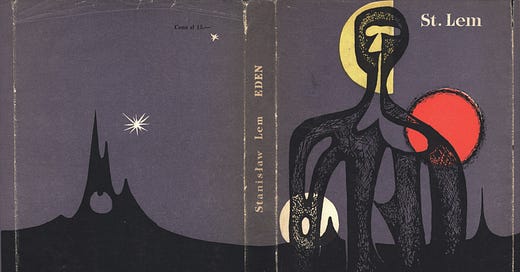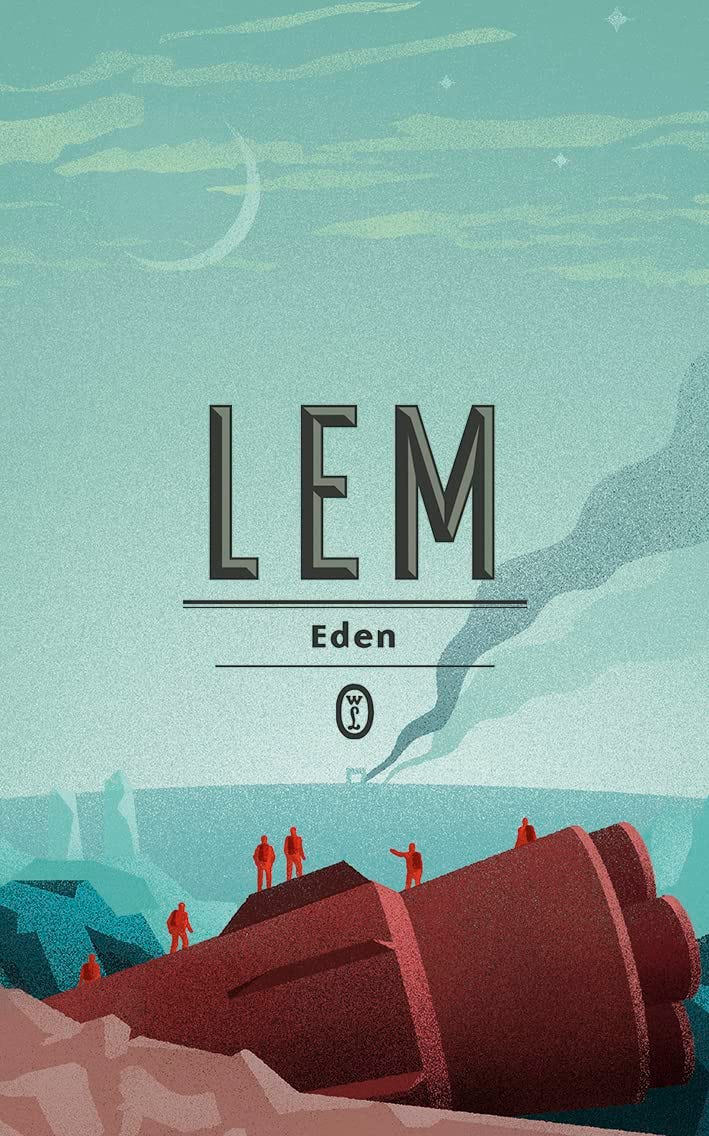Book Review: Eden by Stanislaw Lem
Polish science fiction master's story of science encountering the truly alien
Stanisław Lem—a Polish novelist, futurologist, literary theorist, and satirist—is one of the most imaginative voices in science fiction. His work is marked by a rare combination of philosophical inquiry, scientific curiosity, and biting humor, all set against the backdrop of a wondrous and unsettling future.
Lem’s Themes and Style
Lem’s fiction explores the limits of human understanding, the nature of intelligence (both artificial and alien), and the often absurd or tragic consequences of human ambition. Unlike many science fiction authors who offer either utopian visions or dystopian warnings, Lem’s approach is disinterested, probing the internal logic of technology and evolution without moralizing. His stories frequently grapple with the idea that true communication with the unknown—be it extraterrestrial life or advanced artificial intelligence—may be fundamentally impossible, a theme most famously explored in his 1961 novel Solaris.
I recently read his 1959 novel Eden, and I think it represents his themes and style to perfection. One could say that it was the novel that began his mature period as a science fiction writer. It would be a good novel to start with if you have never read Stanislaw Lem.
The novel follows a spaceship crew—identified only by professions like "The Engineer" or "The Doctor"—after they crash-land on the planet Eden. Their attempts to understand the alien "doublers" and a nightmarish, automated society reveal a civilization defined by totalitarian control, mass graves, and absurdity. Lem masterfully weaponizes the crew's failure to communicate or comprehend Eden's logic, framing it as a metaphor for humanity's limitations when confronting the truly alien
In Eden, Lem rejects a tidy resolution; instead, he emphasizes the impossibility of mutual understanding between species. This contrasts sharply with American sci-fi's frequent optimism about exploration and conquest, seen in early "Manifest Destiny"-inspired space operas (Arthur C. Clarke, Robert Heinlein) or cyberpunk's critiques of capitalism. While American works often center on individual heroism (The Martian) or societal collapse (Blade Runner), Lem dissects systemic oppression through Eden's faceless, eugenics-driven regime
Lem infuses Eden with black humor, targeting authoritarianism. The crew's futile attempts to apply human logic to the doublers' world—like interpreting a mistranslated "factory" as evidence of "lunacy"—satirize bureaucratic incompetence and ideological rigidity. This aligns with Eastern European sci-fi's tradition of using dystopia to lampoon real-world totalitarianism (e.g., Soviet-era critiques). American sci-fi, conversely, prioritizes action-driven narratives or technological spectacle, even when addressing oppression (The Hunger Games).
Alien Communication as an Existential Crisis
The novel's core theme—humanity's inability to grasp truly alien consciousness—diverges from American sci-fi's anthropocentric approach. Where American first-contact stories often feature relatable aliens (Arrival, E.T.), Lem's “doublers” (the aliens on planet Eden) remain incomprehensible, their language untranslatable, and their motives opaque. This reflects Eastern European sci-fi's philosophical preoccupation with the limits of knowledge and the "black humor" of cosmic insignificance
Despite Lem's self-critique (calling the novel "so-so" for its "schematic" characters), Eden remains pivotal for its realistic exploration of communication barriers and totalitarian dread. The deliberate pacing—slow-burn confusion giving way to devastating revelations—serves its theme: understanding is often illusory, and empathy fails across chasms of difference.
I urge you to seek out this highly readable and intelligent science fiction. His work came late to English readers because of the Cold War, but he is a masterful writer who deserves a place alongside the great writers of the 20th century.
Brief Publishing History of Eden
Eden was first published in serial form in 1958 in the newspaper Trybuna Robotnicza, with its first book edition appearing in 1959 (see cover illustration above). The paperback publishing history of Eden spans several decades and languages, reflecting the novel’s international popularity.
First Book Edition (1959): The novel was first published as a book in Poland, but this was not a paperback; early editions were typically hardcover or cloth-bound.
English Paperback Editions:
1991: The first widely available English-language paperback edition was published by Harper Voyager on October 31, 1991 (ISBN: 9780156278065), with 276 pages.
Other English Reprints: Additional English paperback reprints have been issued by different publishers, but the 1991 Harper Voyager edition is the most prominent.
While Eden was available in book form since 1959, its paperback publishing history began in earnest in the 1970s and 1980s in various languages, with the English paperback first appearing in 1989. At present, there are translations of this novel in over 26 languages, with some truly marvelous cover illustrations.
Additional Links
Wonderful English website dedicated to Stanislaw Lem with extensive notes, interviews, and essays on the writer and his works
A good overview of Stanislaw Lem with biography and bibliography.







